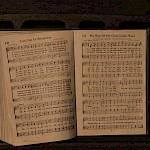Two Letters on the Marriage of an Evangelist
One of the Lord`s servants, after having been devoted to the work of preaching the gospel for three years, contemplated marriage. But it was pressed upon him by some that, as he had not sufficient income to keep a wife and family, he ought, before undertaking such responsibility, to seek some secular employment. In these circumstances, although he was clear in his own mind, he asked the judgment of the two well-known and valued labourers whose letters are here given.
First Letter
Dearest Brother, — Not one of the passages Mrs.- quotes applies to the question. That those who have occupations, as — and others, should evangelize all they can is all very well, but that is not being given up to the work of evangelizing where God has called us to it. Mrs. speaks of deacons or evangelists. But deacons are not evangelists. Serving tables was set up that the apostles might not be hindered in evangelizing; and when Stephen and Philip became evangelists, they gave up their place as deacons, at any rate Philip, for he left Jerusalem.
Next, that when a person is an aged widow, or an elderly matron, should teach young wives to be stayers at home is all well, but what it has to say to an evangelist having an occupation — I am at a loss to see.
Providing for one`s own — though, of course, a man is bound to cherish and care for his wife — speaks of a wholly different and indeed opposite case, that the Church should not be charged with widows who had children, but that they or young members of their family should provide for them. I have gone through them all, and none apply at all, unless 2 Cor. 12:13,14; nor does that. Paul had no wife, and no home, and no fortune, and tells us he had no certain dwelling-place. He would not take from the Corinthians because they were fond of money, but talks of it as a wrong, and that it was an extraordinary thing (but he took from others for the gospel`s sake), and in 1 Cor. 9 he discusses the whole matter on the ground that they which preach the gospel should live of the gospel. Peter led about a sister, a wife, and Paul insists that he and Barnabas had the same right, so did the brethren of the Lord, and the apostles. (1 Cor. 9:5.)
So that the direction of the Word is quite plain. And heaps of brethren have so done on the Continent. If they have families, no doubt they must have a house; but the Lord has taken care of them, and their families have been educated, and get on just as other people`s have. In one case there were eleven children. Of course, such cases require faith in a woman to undertake when in it. I have often seen them have more courage than men. My experience is wholly against him called to be an evangelist taking up a means of providing by other occupation. It is putting this world and human care before God`s calling, and their spiritual work is spoiled in its very root. It is a wholly different thing, and the opposite as to faith, where those who have occupations break out of their bounds to evangelize. If a man be called of God to give himself up to evangelizing, that is another matter, but departing from the path of faith is a serious thing.
I am thankful you were all refreshed at Lewes. It is grace from the Lord.
Affectionately yours, dear brother in Him, J.N.D.
“Trust in the Lord, and wait patiently for Him.”
Second Letter
Dearest -, The mission by Christ of the twelve for the time when He was still upon earth, as in Matt. 10, etc., had differences introduced by Himself when He was anticipating another position for Himself than that of being on earth, as Luke 22:36. Himself had kept in check the power of evil when down here; when He had been rejected they were rejected in Him by man, and His flock became as sheep for the slaughter.
As called to follow Paul as he followed Christ, it is a path of faith, and of faith only, on which I find myself. Paul saw how a wife would impede his course, and he took none. He was above any need, through the power of grace and the Spirit, of human nature, and he left all to follow Christ. He never despises marriage, or God, who as Creator ordained it in Eden. But while he teaches and presses that it is right for some, if need be, to marry, he had no need; and he was above human nature`s line in giving himself to the work of the Spirit. 1 Cor. 7 gives his truth to us on the subject.
If God's word through Paul told me that I ought to marry, I hope I should do so. The Lord to whom I look for everything in this life, ever since I found that He had given me to Christ, is He to whom I did look when I was a young man upon this subject; and if He said marry, He also would say what I was to do when married, as to food and raiment, whether to be fed by Him direct, or whether to make tents. Of course, for an unmarried man to say, `I go out and serve the Lord in His word, and care not what I get to eat, or where I sleep, it is only myself that will suffer,` is different from a married man doing it. But still the question is for faith to answer.
What I sometimes say to young men is this: The first question is, Are you prepared to give up, or to keep on as having given up, time for eternity; to make service in the Word the one business of your life, contempt and poverty and difficulty notwithstanding? Have you given up self for Christ?
If anyone says `Yes,` Paul is his model of the better way. If Paul`s letters tell me that I ought to marry, I take his doctrine as guiding me in my conduct in that. Still, though it becomes me to judge myself in taking a wife — and how far my faith will carry me afterwards — clearly the sparrows of the air, and the beasts of the wilds, and the fish of the sea, assure me that God feeds those who have no gagne-pain.
They that preached the gospel lived of the gospel (i.e. evangelists) in Paul's day, that was God's own order; not a paid clergy, not a settled employment in business, but to be evangelists, and to look to God for food and raiment. And it is good for us saints to see those who have faith so to act, and good for us who aspire to the name of workmen to give in humbleness ensamples of trusting in the Lord, and in the Lord alone, and of enduring hardness for His name and work's sake, if needs be.
Most affectionately in the Lord, Yours, G.V.W.
Previous article Next article




